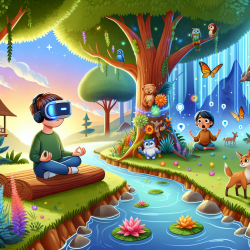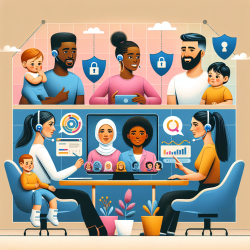Introduction
In the evolving landscape of therapy, particularly for children, innovative approaches are essential to achieve optimal outcomes. The recent study titled "Virtual nature experiences and mindfulness practices while working from home during COVID-19: Effects on stress, focus, and creativity" offers valuable insights that can be applied to enhance therapeutic practices. This blog explores how the findings from this research can be integrated into child therapy, particularly in the context of online therapy services provided by companies like TinyEYE.
Research Highlights
The study conducted during the COVID-19 pandemic evaluated the effects of virtual nature experiences and mindfulness practices on stress, focus, and creativity among remote workers. Key findings include:
- Virtual nature experiences significantly increased focus and reduced stress.
- Combining virtual nature with mindfulness practices enhanced convergent thinking.
- Daily exposure to these interventions for just 10 minutes proved beneficial.
Implications for Child Therapy
While the study focused on adult remote workers, the principles can be adapted for child therapy, particularly in speech language pathology. Here’s how:
Stress Reduction
Children, especially those with communication challenges, often experience heightened stress. Incorporating virtual nature experiences into therapy sessions can create a calming environment, reducing anxiety and making children more receptive to therapy.
Focus Enhancement
Maintaining a child’s attention during therapy can be challenging. Virtual nature scenes can capture and sustain attention, enhancing engagement and the effectiveness of therapeutic interventions.
Creativity Boost
Creativity is crucial in therapy, enabling children to express themselves and therapists to devise innovative strategies. The study suggests that combining virtual nature with mindfulness can boost creative thinking, which can be particularly beneficial in developing personalized therapy plans.
Practical Implementation
For practitioners looking to integrate these findings into their practice, consider the following steps:
- Incorporate Virtual Nature: Use VR headsets or screen-based nature simulations during sessions to create immersive environments.
- Mindfulness Practices: Introduce short mindfulness exercises tailored for children, focusing on breathing and awareness.
- Monitor and Adapt: Regularly assess the impact of these interventions on each child and adjust strategies as needed.
Encouraging Further Research
While the current study provides a solid foundation, further research is needed to explore the long-term effects of these interventions on children. Practitioners are encouraged to document outcomes and share findings to contribute to the growing body of knowledge in this area.
To read the original research paper, please follow this link: Virtual nature experiences and mindfulness practices while working from home during COVID-19: Effects on stress, focus, and creativity.










